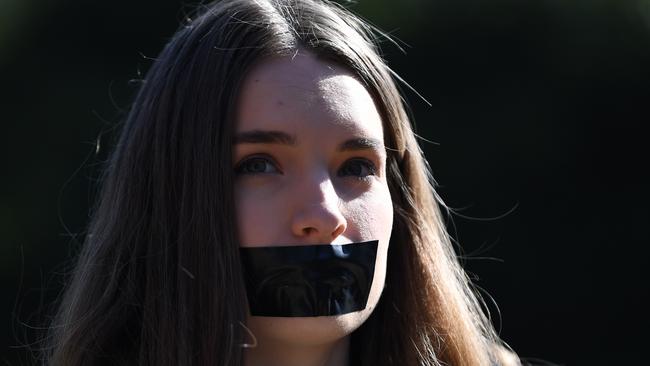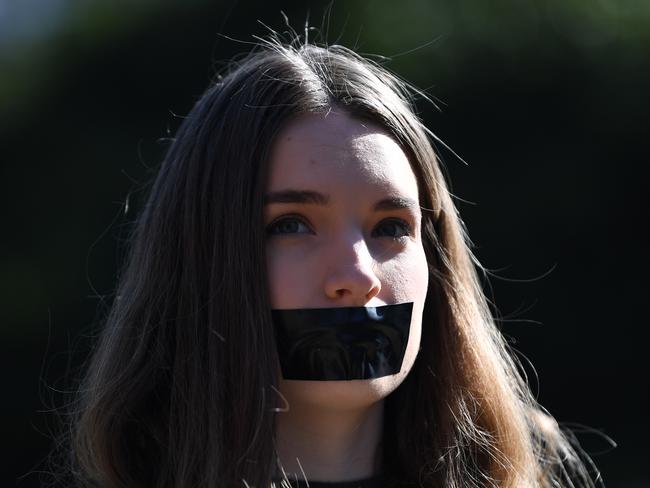Survey reveals sexual assault and harassment at Australian universities
A SURVEY of university students in Australia has revealed the worst campuses for sexual harassment and assault.

A SURVEY of university students in Australia has revealed the worst campuses for sexual harassment and assault.
The Australian Human Rights Commission surveyed 30,930 students at 39 Australian universities and found one in five of them had experienced sexual harassment in a university setting, which includes travel to and from campus and uni-endorsed events off-campus.
Even if you exclude travel, 21 per cent of students were still sexually harassed in a university setting in 2016.
Harassment can include staring or leering, unwelcome touching, suggestive jokes, intrusive questions about private life, repeated unwanted requests for a date, requests or pressure for sex or other acts, indecent exposure and sexually explicit posters, gifts and emails.
The survey also found 94 per cent of students who were sexually harassed did not make a formal complaint to their university.
When it comes to sexual assault, which includes rape and other acts when a person is forced, coerced or tricked into sexual acts against their will or have withdrawn their consent, 84 per cent did not report it.
Universities also released individual statistics for their campuses.
University of New England students reported the highest percentage of on-campus sexual assaults with 4 per cent of those surveyed saying they had been assaulted in 2015 and/or 2016. This was much higher than the national average of 1.6 per cent.
It was followed by the Australian National University (3.5 per cent), Charles Sturt (3.3 per cent), the University of South Australia (3 per cent) and Bond University (2.7 per cent).
When it came to students being sexually harassed in general, Bond University and ANU both topped the list on 38 per cent, compared to the average of 26 per cent.
They were followed by Notre Dame (32 per cent), University of Technology, Sydney (31 per cent) and the University of Sydney (31 per cent).
There are more than 1 million students enrolled in Australian universities and the AHRC report noted that the 30,000 who answered the survey, which was emailed to 319,252 students, may have been motivated to respond and those who have been sexually assaulted or harassed may have been more likely to respond.
However, those who had experienced assault may also have found it too traumatic to respond so this may also have impacted on the results.
The report included examples of sex attacks at booze-fuelled uni and college parties, and a binge-drinking sex culture at university-owned or affiliated accommodation. It’s also revealed the gauntlet students run when they catch public transport to and from class.
UNE Vice-Chancellor Annabelle Duncan released a statement that sexual harassment and assault were unacceptable.
“This is everyone’s business and I urge students and staff alike to step up to address this problem,” she said.
“UNE will not tolerate sexual harassment and assault, in any form or in any environment.”
Meanwhile ANU Vice-Chancellor Professor Brian Schmidt released a statement apologising to those who had experienced sexual harassment or assault on campus.
“One incident is more than we should accept,” he said.
“I also want to say sorry to any student, to any staff member, to any member of our alumni community who has not received what they needed from the university in dealing with sexual harassment or sexual assault.
“We must – and we will – do better.”
The report paints a grim picture of a binge-drinking culture at university-linked accommodation, such as colleges, halls and dorms, where students are more likely to fall victim to sexual assault and harassment.
Student residents have told of excessive alcohol consumption being a major feature of college life and of it being accepted practice to have sex with heavily intoxicated partners.
One ad for a college party promised: “Beer $2, bitches free.”
Another student blamed the lad culture of his college for helping to “cultivate scenarios where taking advantage of intoxicated people was accepted and commonplace”.
Just 7 per cent of students surveyed were living in uni-linked accommodation but of all the students who reported sex assaults in university settings, 34 per cent were living in that type of accommodation.
The disproportionate result suggests student residents are at greater risk of both assault and harassment.
The survey also identified public transport as a less obvious danger zone for students.
It was the most commonly reported location for sexual harassment (22 per cent) and the second most common for sexual assault (15 per cent).
Most of those who did the harassing were also university students, but those perpetrating sexual assaults on travelling students were mostly strangers.

The AHRC report included disturbing examples of harassment including female students being assigned ratings based on their sexual desirability or shamed about their sex lives as part of hazing and college “traditions” at some unis.
One student was sexually assaulted and had the experience broadcast over the residential college’s PA system as a “hook up”.
One college held an annual “feral women’s night” where first-year female residents were force-fed alcohol, told to remove their tops and serve drinks to older male residents while being subjected to derogatory comments and chants, the report said.
The report said hazing practices often involved excessive alcohol consumption, performing humiliating and degrading acts, and in many cases the sexual assault and harassment of female residents.
“You had to participate. There was nothing you could do about it,” one student said.
“The administration knew about this and they condoned this.”
The report said some college traditions involved male residents singing songs or chants that encouraged sexual violence against women.
Women were often shamed on the basis of their sex lives while male college residents were glorified or praised, the report said.
“Conquests of guys getting girls from other colleges were broadcasted weekly in this gossip section the whole college had, where you would submit your experiences to an executive, and on weeknights we would gather and hear about everyone’s conquests that week,” one submission said.
“Women were described as objects or trophies.”
Sex Discrimination Commissioner Kate Jenkins said there was a worrying perception colleges were aware of the hazing and college traditions and did nothing to prevent them.
“The fact that these behaviours continue to exist in colleges and that they involve sexual assault and sexual harassment of students, who in some cases are in their first week or even their first day in college, is deeply concerning.”
HOW UNIS ARE DEALING WITH SEXUAL ASSAULT AND HARASSMENT
Universities Australia - National Response
* All unis back a 10-point action plan, including developing a respectful relationships program tailored for students, and specialist training for staff about responding to reports of incidents.
* Will run a follow-up survey.
* 24-hour support phone line (1800 572 224) where students can speak to specialist counsellors from Rape and Domestic Violence Services Australia.
Australian National University
* Independent review of all policies and procedures and steering group to address sexism, sexual harassment and sexual assault on campus.
* Review of residential colleges and their culture; may revoke affiliation if they don’t participate.
* Canberra Rape Crisis Centre counsellors on campus full-time.
* Consent training for all students, and staff education on dealing with disclosures of harassment and assault.
University of Melbourne
* Will use survey findings for comprehensive and sustained improvements.
* Respect Taskforce to improve the university’s culture, policies and practices.
* From 2018, all students will be trained in communication and relationships, bystander intervention and sexual consent, and receive better information about how to report assault and harassment.
Western Australia
* Curtin, Edith Cowan, Murdoch, Notre Dame and University of WA have signed a collective commitment to make campuses safer.
* To provide clear information to students about assault and harassment, working with residence management to give students instruction in consent and respectful behaviour, and improving security measures.
University of Canberra
* Former Sex Discrimination Commissioner Elizabeth Broderick to review culture regarding harassment and assault.
* Offering a healthy relationships program to students in residences.
* Canberra Rape Crisis Centre providing university staff with education in areas including ethical bystander training.
* Upgraded security on campus.
University of Tasmania
* Professor Margaret Otlowski appointed culture and wellbeing chancellor to lead a review.
University of Sydney
* Helpline 1800 SYD HLP (1800 793 457) where students can reach security, support services and reporting channels if they are the victim of, or see, an assault or harassment.
* NSW Rape Crisis Centre training staff and security in responding to incidents.
* Consent and respect training compulsory for all students from 2018.
* Vice-chancellor Michael Spence will meet students and staff to discuss further response.
University of Queensland
* Specialist-trained sexual misconduct unit to give students support, advice and counselling.
* First responder network to facilitate better disclosure of assaults and harassment.
* Comprehensive policy to prevent and address cases of sexual assault and sexual harassment.
Monash University
* Developed a support app where students can get advice about where to find help or how to report assault or harassment, as well as how to support friends who might have been victims.
University of Adelaide
* SA Equal Opportunity Commission to audit safety processes.
* Dedicated phone line to encourage students to report assaults and harassment.
* Training for all students and key staff.



